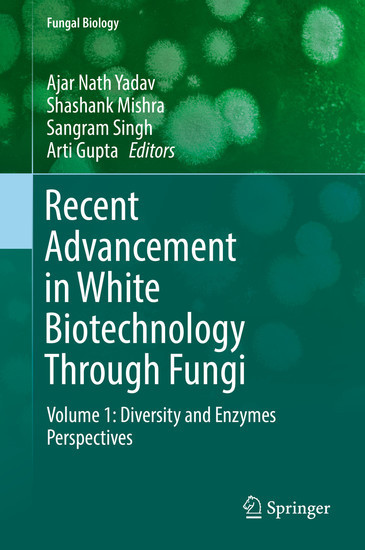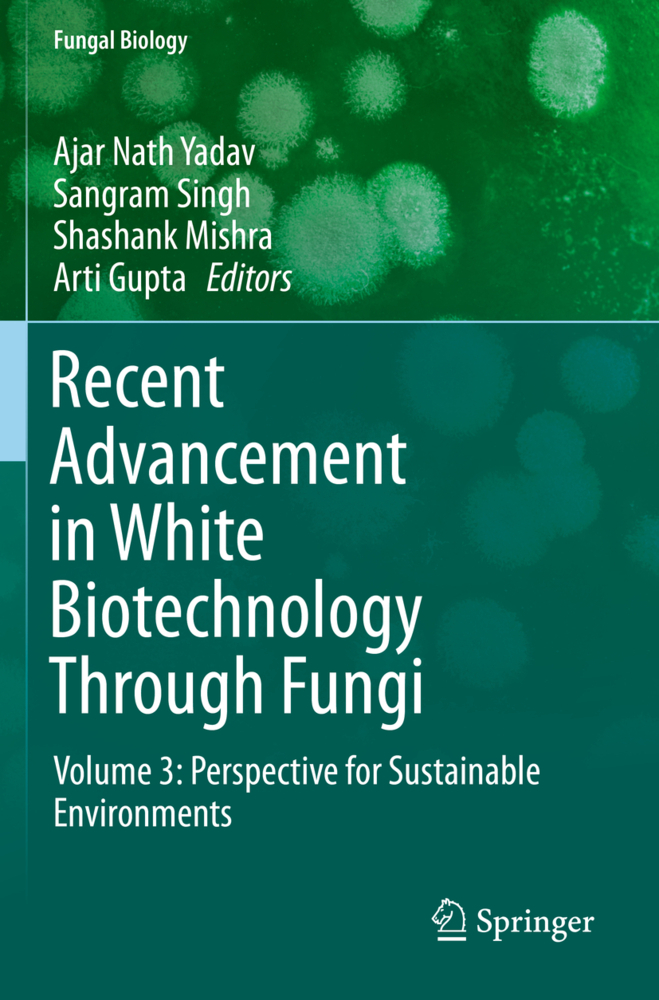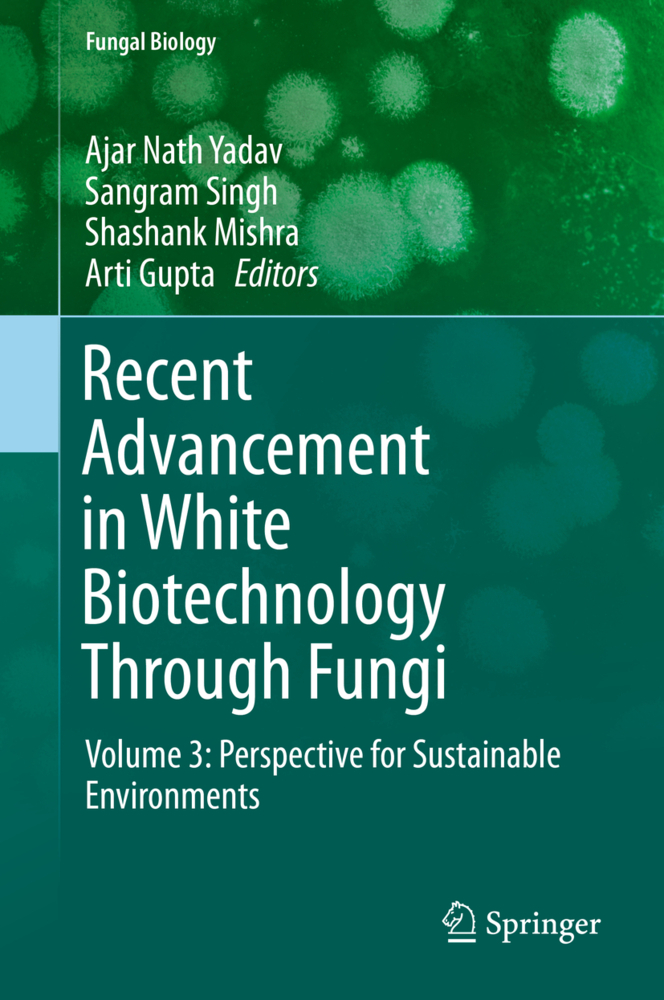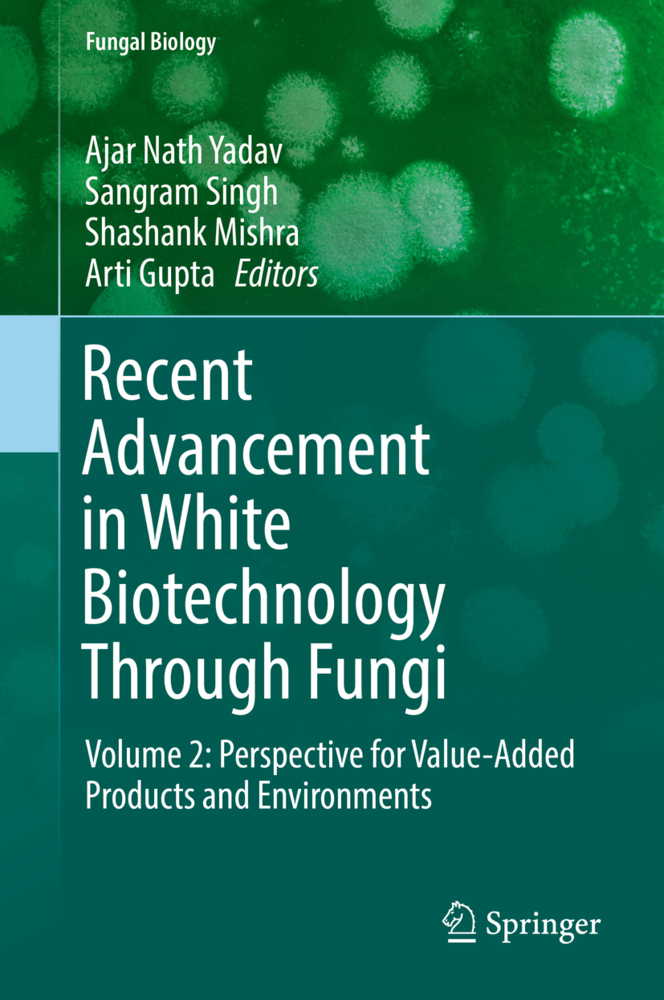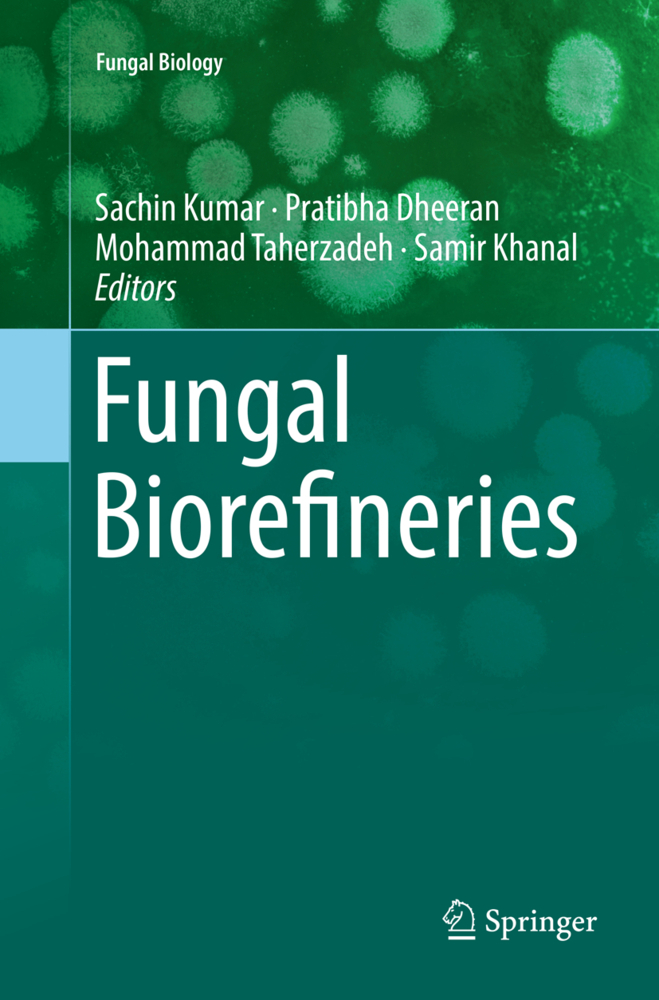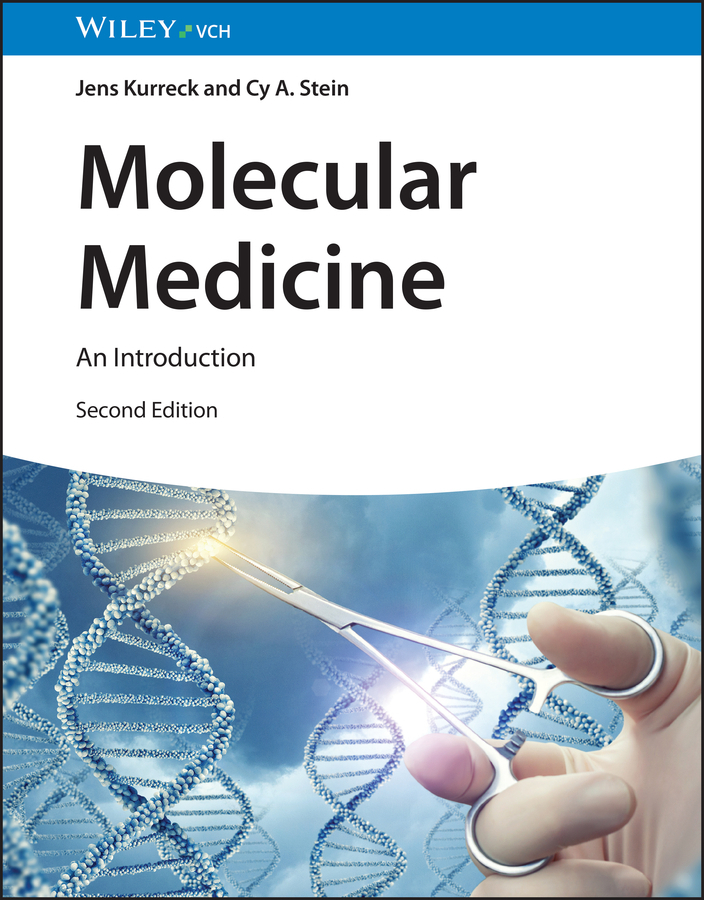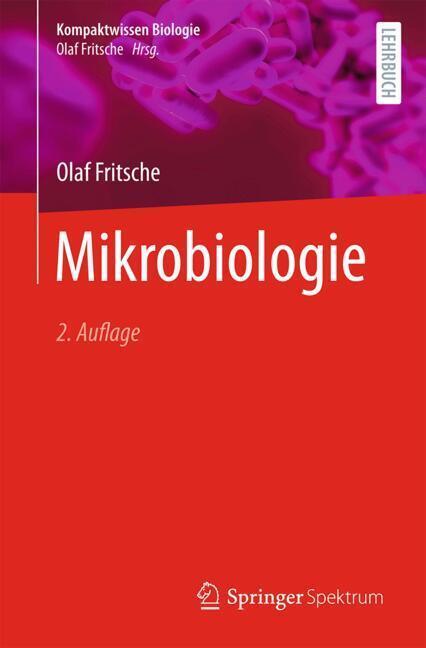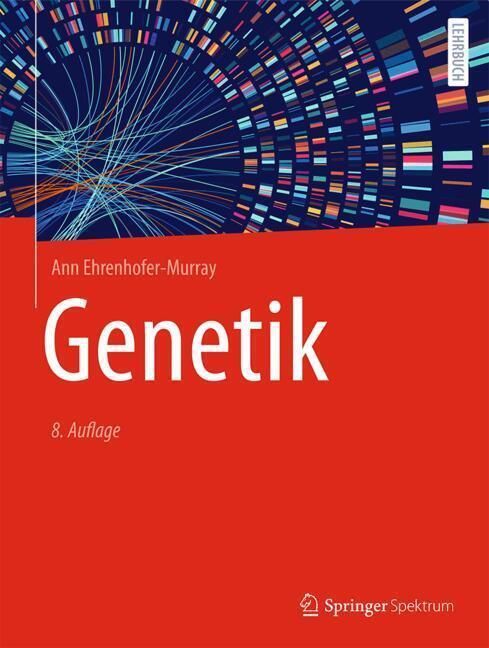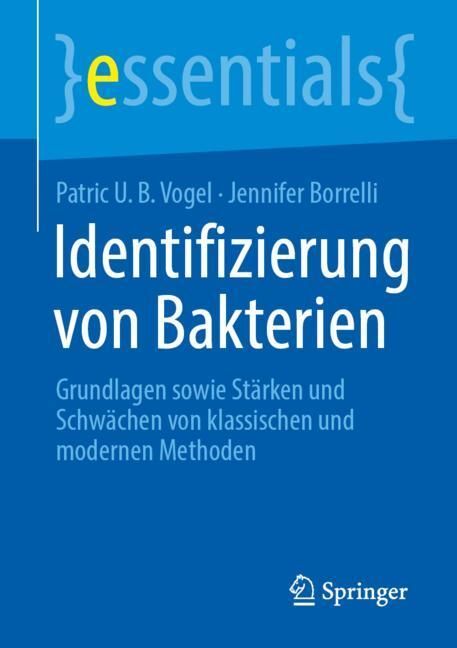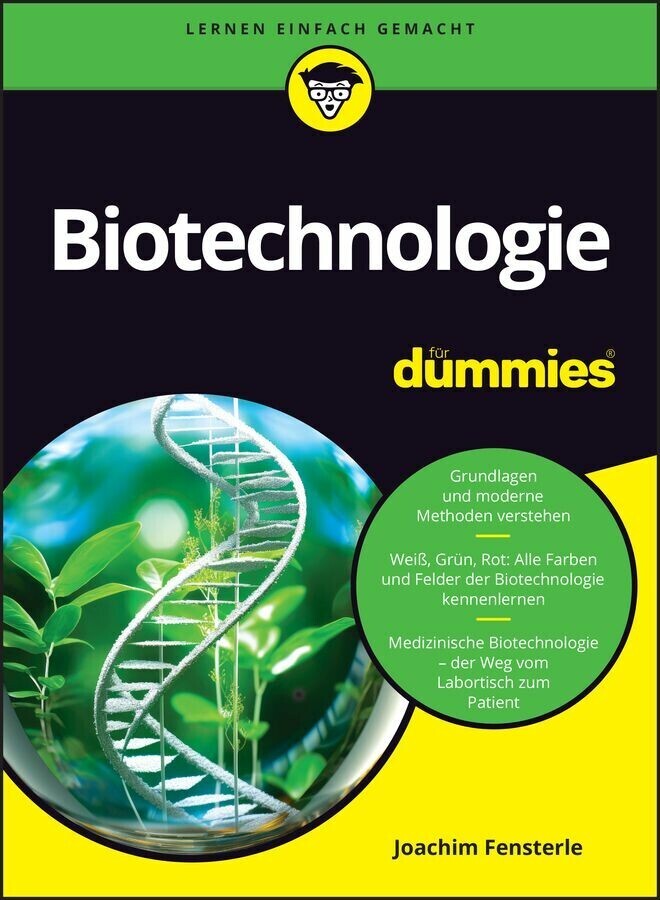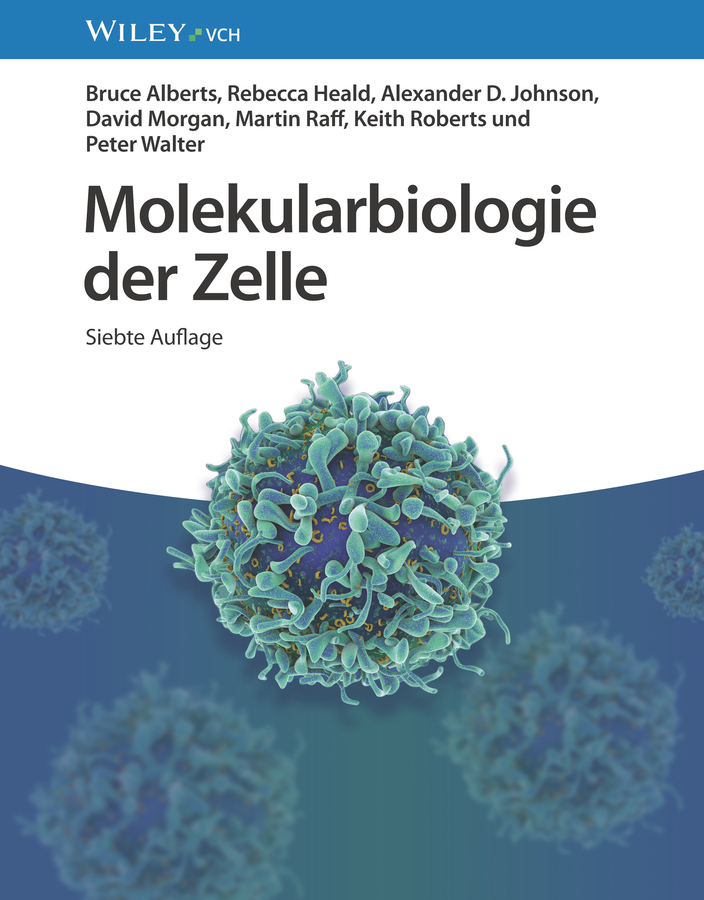Recent Advancement in White Biotechnology Through Fungi
Volume 1: Diversity and Enzymes Perspectives
White biotechnology, or industrial biotechnology as it is also known, refers to the use of living cells and/or their enzymes to create industrial products that are more easily degradable, require less energy, create less waste during production and sometimes perform better than products created using traditional chemical processes.
Over the last decade considerable progress has been made in white biotechnology research, and further major scientific and technological breakthroughs are expected in the future. Fungi are ubiquitous in nature and have been sorted out from different habitats, including extreme environments (high temperature, low temperature, salinity and pH), and may be associated with plants (epiphytic, endophytic and rhizospheric).
The fungal strains are beneficial as well as harmful for human beings. The beneficial fungal strains may play important roles in the agricultural, industrial, and medical sectors. The fungal strains and their products (enzymes, bioactive compounds, and secondary metabolites) are very useful for industry (e.g., the discovery of penicillin from Penicillium chrysogenum ). This discovery was a milestone in the development of white biotechnology as the industrial production of penicillin and antibiotics using fungi moved industrial biotechnology into the modern era, transforming it into a global industrial technology. Since then, white biotechnology has steadily developed and now plays a key role in several industrial sectors, providing both high value nutraceutical and pharmaceutical products. The fungal strains and bioactive compounds also play an important role in environmental cleaning. This volume covers the latest developments and research in white biotechnology with a focus on diversity and enzymes.
Dr. Ajar Nath Yadav is an Assistant Professor in Department of Biotechnology, Akal College of Agriculture, Eternal University, Baru Sahib, Himachal Pradesh, India. He has 3 years of teaching and 9 years of research experience in the fields of Industrial Biotechnology, Microbial Biotechnology, Microbial Diversity, and Plant-Microbe-Interactions. Dr. Yadav obtained a doctorate degree in Microbial Biotechnology jointly from Indian Agricultural Research Institute, New Delhi and Birla Institute of Technology, Mesra, Ranchi, India; a M.Sc. (Biotechnology) from Bundelkhand University and a B.Sc. (CBZ) from University of Allahabad, India. He has produced 82 publications [31 Research papers, 7 Review articles, 26 Book chapters, 8 Popular articles, 7 Editorials, 2 Technical reports and 1 Patent] in different reputed international and national journals. Dr. Yadav has published 105 abstracts in different international and national conferences. He has presented 19 paper presentations in national and international conferences and got 10 best paper presentations Award and 1 Young Scientist Award (NASI-Swarna Jyanti Purskar). Presently, he is guiding 2 scholars for PhD degree and 1 for M.Sc. dissertations. Dr. Yadav and his group have developed a pioneering method for the screening of archaea for phosphorus solubilization. Dr. Yadav is editor/reviewer of different international journals including Nature-Scientific Reports, Microbial Ecology; Plos One, Frontier in Microbiology, Springer Plus, Annals of Microbiology, Journal of Basic Microbiology, Advance in Microbiology and Biotechnology. He has lifetime membership of Association of Microbiologist in India, Indian Science Congress Council, India and National Academy of Sciences, India.
Dr. Shashank Mishra is presently working as Scientist 'C', BiotechPark, Lucknow, Uttar Pradesh, India. He obtained his doctorate degree in Science 'Industrial Biotechnology' from Birla Institute of Technology, Mesra, Ranchi, India, his M.Sc. (Biotechnology), from Barkatullah University, Bhopal and his B.Sc. (CBZ) from Dr. R.M.L. University, Faizabad, India. He has made pioneering contributions in the area of microbial biotechnology, natural product synthesis and e
Over the last decade considerable progress has been made in white biotechnology research, and further major scientific and technological breakthroughs are expected in the future. Fungi are ubiquitous in nature and have been sorted out from different habitats, including extreme environments (high temperature, low temperature, salinity and pH), and may be associated with plants (epiphytic, endophytic and rhizospheric).
The fungal strains are beneficial as well as harmful for human beings. The beneficial fungal strains may play important roles in the agricultural, industrial, and medical sectors. The fungal strains and their products (enzymes, bioactive compounds, and secondary metabolites) are very useful for industry (e.g., the discovery of penicillin from Penicillium chrysogenum ). This discovery was a milestone in the development of white biotechnology as the industrial production of penicillin and antibiotics using fungi moved industrial biotechnology into the modern era, transforming it into a global industrial technology. Since then, white biotechnology has steadily developed and now plays a key role in several industrial sectors, providing both high value nutraceutical and pharmaceutical products. The fungal strains and bioactive compounds also play an important role in environmental cleaning. This volume covers the latest developments and research in white biotechnology with a focus on diversity and enzymes.
Dr. Ajar Nath Yadav is an Assistant Professor in Department of Biotechnology, Akal College of Agriculture, Eternal University, Baru Sahib, Himachal Pradesh, India. He has 3 years of teaching and 9 years of research experience in the fields of Industrial Biotechnology, Microbial Biotechnology, Microbial Diversity, and Plant-Microbe-Interactions. Dr. Yadav obtained a doctorate degree in Microbial Biotechnology jointly from Indian Agricultural Research Institute, New Delhi and Birla Institute of Technology, Mesra, Ranchi, India; a M.Sc. (Biotechnology) from Bundelkhand University and a B.Sc. (CBZ) from University of Allahabad, India. He has produced 82 publications [31 Research papers, 7 Review articles, 26 Book chapters, 8 Popular articles, 7 Editorials, 2 Technical reports and 1 Patent] in different reputed international and national journals. Dr. Yadav has published 105 abstracts in different international and national conferences. He has presented 19 paper presentations in national and international conferences and got 10 best paper presentations Award and 1 Young Scientist Award (NASI-Swarna Jyanti Purskar). Presently, he is guiding 2 scholars for PhD degree and 1 for M.Sc. dissertations. Dr. Yadav and his group have developed a pioneering method for the screening of archaea for phosphorus solubilization. Dr. Yadav is editor/reviewer of different international journals including Nature-Scientific Reports, Microbial Ecology; Plos One, Frontier in Microbiology, Springer Plus, Annals of Microbiology, Journal of Basic Microbiology, Advance in Microbiology and Biotechnology. He has lifetime membership of Association of Microbiologist in India, Indian Science Congress Council, India and National Academy of Sciences, India.
Dr. Shashank Mishra is presently working as Scientist 'C', BiotechPark, Lucknow, Uttar Pradesh, India. He obtained his doctorate degree in Science 'Industrial Biotechnology' from Birla Institute of Technology, Mesra, Ranchi, India, his M.Sc. (Biotechnology), from Barkatullah University, Bhopal and his B.Sc. (CBZ) from Dr. R.M.L. University, Faizabad, India. He has made pioneering contributions in the area of microbial biotechnology, natural product synthesis and e
Yadav, Ajar Nath
Mishra, Shashank
Singh, Sangram
Gupta, Arti
| ISBN | 9783030104801 |
|---|---|
| Artikelnummer | 9783030104801 |
| Medientyp | E-Book - PDF |
| Copyrightjahr | 2019 |
| Verlag | Springer-Verlag |
| Umfang | 571 Seiten |
| Sprache | Englisch |
| Kopierschutz | Digitales Wasserzeichen |

